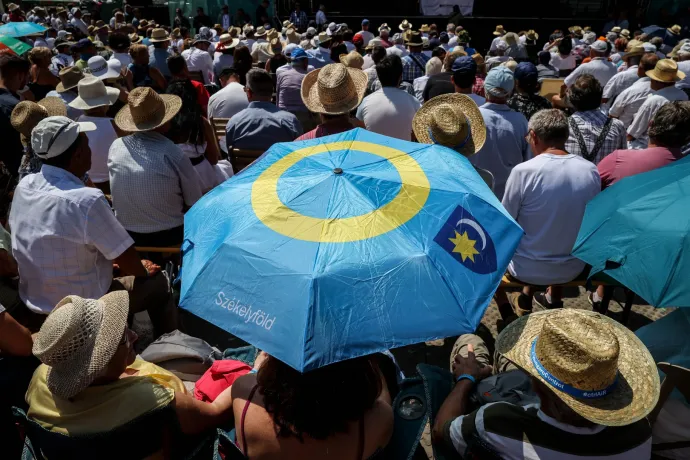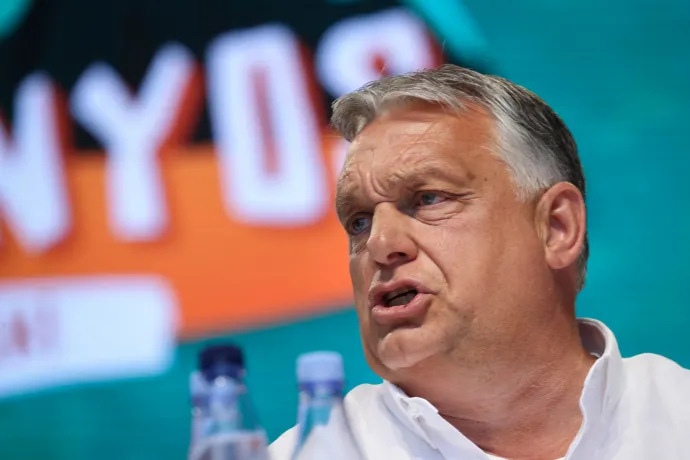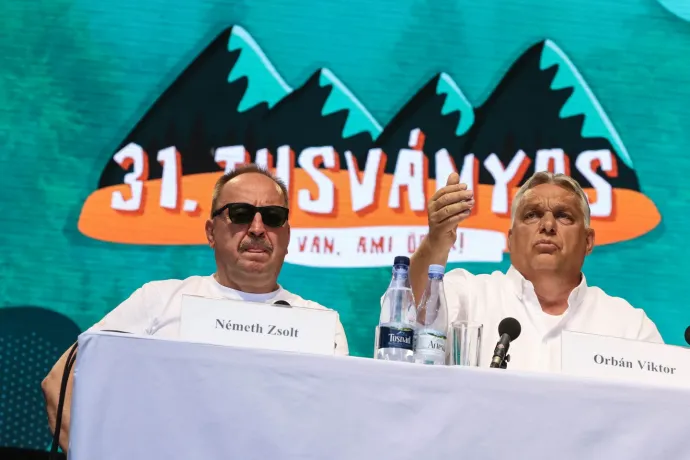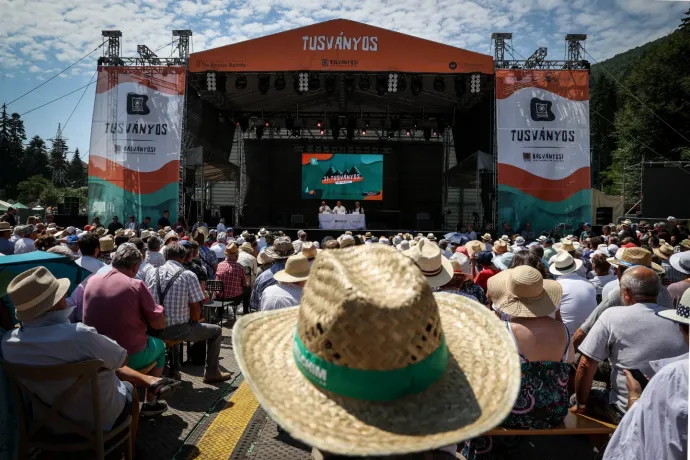
The Bálványos Free Summer University and Student Camp (more commonly known as Tusványos) has been organised in Transylvania since 1990. It has become a large-scale intellectual workshop of the Carpathian Basin, with tens of thousands in attendance. It was originally intended to promote cross-border cooperation, Romanian-Hungarian dialogue and a cultured Hungarian-Hungarian political exchange. According to critics, in recent years it has become a place where members of the Budapest government and representatives of the intellectual establishment close to them express their ideas without substantive debate. It was here that Viktor Orbán first spoke about building an “illiberal democracy’ in 2014, and his speeches have become the highlight of the event and are largely considered to be marking the direction of Fidesz’ politics for the year ahead. This year’s speech was no different.
Viktor Orbán's speech in Tusványos this year was special for several reasons.
First of all, this year's Tusványos was held in a political context in which the government was forced to announce a reduction in the cuts to the utility bill, so there was no way for Fidesz politicians to talk about an encouraging near future. On the other hand, it hasn't happened in quite some time that anyone attempted to disrupt the Prime Minister's speech, which is always the undeniable highlight of the event.
When Orbán said that "We have good reason to drink a Fidesz spritzer: it's two-thirds and one-third", a few people held up a banner with a Romanian inscription stating: "Ceva este etern: Transilvania, pământ românesc!" In other words: "There is something eternal: Transylvania is Romanian land!" Several people gathered around them, covered the sign with an umbrella, and after some shouting, they sat the two of them down and led them out. The scene lasted less than a minute, and Orbán commented with a current political insinuation: “Just be polite, like the Budapest police is with the junkies on the bridges!”
After the speech we asked Bertalan Havasi, the Prime Minister's Press Chief, who exactly the Prime Minister was referring to. "The Prime Minister considers those who have been arrested by law enforcement officers on suspicion of drug use to be drug addicts", wrote the Prime Minister's Press Chief, apparently referring to one of the leaders of the Two-tailed Dog Party.
After the brief interlude, Orbán launched into his real speech, which was structured around five main themes. We will summarise the main points one by one. Each time he spoke about a challenge in any of the areas discussed, Orbán went on at length about how he believes the West is often giving the wrong answers to these questions.
1. Demographics and the disappearing west
According to Orbán we have entered the season of dangers, and the pillars of Western civilization which were previously considered unshakeable are cracking. He brought up three examples: we used to think that we are living in the protective bubble of science, but then a virus came. We used to think that there can’t be war in Europe, but now there is one: next door to us. And we also used to think that the cold war cannot return – and yet, today there are many people working on arranging our lives into blocks.
He first spoke about the decline of Western civilisation. In his opinion, what we are seeing now is not a spiritual and demographic decline like a hundred years ago, but is a decline in authority and a material decline. "The rival civilisations have learned Western technologies, but they have not adopted the value system," he concluded. According to the Prime Minister, the most painful part of this is that we have lost control of the energy carriers.
Orbán said that the West is losing the battle for raw energy resources.
Most of the world’s energy carriers and resources are located outside of Western civilization. And our situation is twice as hard as that of other countries.
In 2013, the United States launched a new technology of extraction, which means a stronger position in terms of international security, they said. Essentially, it is being used as a foreign policy weapon, Orbán translated. They are pursuing a bolder sanctions policy and have begun strongly encouraging allies to buy supplies from the US.

Speaking about European values, Orbán said that the EU wants to reduce everyone's gas consumption. Orbán does not know how this could be done, but said "there is German know-how". According to the Prime Minister, the plan is for those who run out of gas to take it away from those who have it, which is simply called “Einstand”. (Note: Although the German meaning of this term is different, it has been used among Budapest children for a long time to describe situations where someone's property is seized in an outrageous manner by the one stronger than them.) So the West no longer has raw materials, only military power and capital.
According to Orbán, in this situation the first and greatest challenge is population growth and demographics. “Recently we have had many more funerals than baptisms.” He said that the peoples of the world can be put into two groups: those who are capable of biologically perpetuating their people, and those who are not. We are in the latter group. Although things have become slightly better, there has been no turnaround – even though it all comes down to this. “If things don’t change, others will fill the Carpathian basin instead of us.”
2. Migration and the post-western world
The other topic that Orbán spent much time analysing was that of migration – which in his opinion has divided Europe in two. One of the sides is a world where European peoples and those from elsewhere are living together.
“These countries are not nations. They are a conglomerate of people groups. That is no longer the West, it is post-West. And the final demographic shift is going to occur around 2050.”
"The other half of Europe is us, Central Europeans." There is a battle between the two sides. We have made an offer to leave each other alone, to let everyone decide for themselves who they want to live with, but they refused this, and there is now a battle to make us like them. "Brussels and the Soros-teams want to force migrants on us" Orbán said.
Orbán said that although there is less talk about migration these days, the situation remains the same: "George Soros and the forces in Brussels still want to force migration on us". Hungary has been taken to court, and "we have been convicted", the Prime Minister said, adding that the only reason why the sentence has not yet been implemented is the Ukrainian crisis. "All we ask is that they do not try to impose on us the fate which we do not see as a matter of fate but as our nation's destiny."
The prime minister believes that it is the deception of the internationalist left that Europe is already a mixed population. Orbán said it was a scam.
There are places where European and non-European peoples mix, and where European peoples mix, like the Carpathian Basin. "We are not a mixed race" – he said – "and we do not want to be".
3. The question of gender and the western craze
The next topic of Orbán's speech was gender. "There has been less talk about it, but we have been taken to court on this issue as well, and we are awaiting the results," he said, referring to the EU's procedure on the so-called child protection law.
There will never be a majority for that Western folly here.
It simply isn't something Hungarians can understand. There are all these gender-whatevers around, but at the most we can pronounce is a Transylvania," Orbán said.
4. War and the burning stable of the post-western world
Even though the Prime Minister said that the real issue is not war, but migration and gender, he still spoke about this subject the longest.
Orbán said that the post-Westerners are constantly trying to break up the alliance of Central and Eastern European countries, thus the V4 too. The war is helping them in this, for example, the Hungarians and the Poles have shared views on fundamental issues, yet the war has come between us. According to the Prime Minister, this is a matter of the heart, given that from the Hungarian point of view the war is a conflict between two Slavic peoples, which we would like to stay out of, while the Poles feel that they are involved. That is why the Hungarian-Polish relationship must now be rescued not with the heart, but with reason.
Speaking about the Slovaks and the Czechs, Orbán said that they are aligning themselves with the post-Western countries, but added that this was like "tying your horses into a burning stable".
Orbán said that there are countries who criticise us for not being committed enough to the Ukrainians, but they are far away, they give money or weapons and that's it. We, however, are involved: 86 Hungarians have so far died in that war. "Only we have given blood in that war, our critics have not," he said.

Orbán then brought up the long-repeated Fidesz argument. "This is not our war. Hungary is a NATO member, NATO is stronger than Russia and Russia will never attack NATO," he said.
The prime minister also spoke about why he believes the Russia-Ukraine war really broke out. He said that the Russians had made a clear security demand, which they had written down and sent to the Americans and NATO. The Russians have asked that Ukraine never become a member of NATO. The West rejected this, saying that NATO was pursuing an open file policy, and that anyone could apply for membership. Orbán said that this refusal is the reason why the Russians now want to enforce by weapons what they could not do by negotiation.
The Prime Minister also said that if Trump had been the US President and Angela Merkel the German Chancellor at the critical moment, there would be no war today.
In this war, the Western strategy is based on 4 pillars, Orbán said:
- the first is that Ukraine can win a war against Russia with Anglo-Saxon instructors and Western weapons;
- the second is that sanctions will weaken Russia and destabilise its leadership;
- we will deal with the economic consequences of sanctions, it will hurt them more, and us less;
- the world will line up behind us because we are right.
Instead, we have found ourselves in a car with four flat tires" he said. Clearly, this is not the way to win the war. The Ukrainians will never win a war with western trainers and western weapons against the Russians. And it is not just that the world is not with us – it is demonstratively not with us, he said.
There is no point in nurturing the illusion that we are influencing them with our advice. But in any debate this is a moral issue: we have to try to tell them and try to get the West to develop a new strategy. All four punctured tires must be replaced – he said, referring to his earlier sentence.
In his opinion what's needed is peace talks and a good peace offer. It is not the EU's job to side with either the Russians or the Ukrainians. The EU should stand between them, he said.
What will happen? – the Prime Minister asked. "The Russians speak this old language (...) but that doesn't mean that what they say doesn't make sense." A few days ago, the Russian representative said that they would keep pushing until the front was so that it wouldn't be possible to shoot from Ukraine's territory into Russia. This means that the more long-range weapons we give Ukraine, the longer the war will last.
Russia wants security guarantees, so peace will only come if there are Russian-American negotiations – the Prime Minister said.
Europe gambled away its mediation chances in 2014, when the Minsk agreement was concluded with German and French guarantees, but these two countries could not enforce it on Ukraine, so the Russians no longer want to negotiate with the EU, but with the Americans.
After the Second World War, this is where Europe is now, once again the Americans and the Russians will have a say, Orbán continued. He added that the proposal to change the foreign policy decision-making system of the member states so that European foreign policy can be made by a simple majority is very dangerous. If a foreign policy is imposed on a country that it does not want, it must be called imperialism. The reason why Europe cannot become a global political player is because it cannot keep its own house in order.
According to the Prime Minister, the EU cannot even defend its own borders. "Europe should not aspire to a role in world politics", he said, but should only pursue the modest goal of keeping order at home instead.
5. Tha plan for the next 2+2 years: STAY OUT
In the last part of his speech, the Prime Minister addressed domestic policy questions.
First, he spoke about the utility cost cuts. What is the future of this policy in Hungary? – the Prime Minister posed the question and added that it worked perfectly for 10 years, but the war tipped it out of balance. Now the task is to defend the policy, and according to Orbán, this will be successful (he failed to mention that for many people this will actually mean an increase in costs).

Orbán then quantified it too: in 2021, the amount the Hungarian state paid out because of the difference was 296 billion forints (approximately 800 million euros) and in 2022 – if current prices remain until the end of the year – then it will be 2051 billion forints. This is seven times the amount, and obviously, the Hungarian economy cannot bear such an amount, he said.
The public investments that have already been started will be completed, but those that have not been started yet will remain so for the time being, because it is not known whether they could be completed, the Prime Minister said of the public austerity measures.
"We have to come off gas, because electricity is a much smaller burden for Hungary"
-he added regarding the energy mix, explaining that the Paks nuclear plant helps generate electricity, so it can be sold more cheaply. Another option is biomass, " as they call firewood in modern terminology".
The next topic was the economic recession. Orbán said that the weakening of the forint is automatically caused by the strengthening of the dollar against the euro. Nevertheless, the Hungarian economy is forecast to grow. Meanwhile, several countries in Europe are in recession, which leads to political instability. The Hungarian dilemma in this situation is whether a local exception to the global recession is possible. The Hungarian goal is for Hungary to be one.
Orbán outlined the country's plans for the next 2+2 years, but also added those for the longer term.
Staying out is the key word, he said. Hungary will succeed economically if we stay out of war, migration, gender madness, the global tax, and Europe's general recession.
We did it in 2010, and we did it again in 2020 during the epidemic. We have come out of every crisis stronger than we were when we went in," he said. He said a new agreement with the EU was needed, as well as a new agreement with China and the US. If we can achieve this, we can get back on track for growth and development in 2024.
It's worth noting that this year's speech completely omitted any domestic political battles. Orbán mentioned the domestic opposition only in response to a question after his speech: 'we have only one task with the left; we have to keep them in opposition'.
"But we are really working for 2030."
– Orbán said. It is by then that the problems of the Western world will have accumulated. There will be a serious crisis in America, and the problems of the eurozone will also peak at that time; the indebtedness of the South, the paying off of the North – none of it will be sustainable if things remain like this. And there will be new political forces in the Union by then: we will be net contributors, for example, due to better economic development.
According to Orbán, the elements that can be built on are:
protecting our borders, protecting families, military development, diversification of energy sources, taking advantage of the technological shift, the inflow of foreign capital, Hungary’s status as a transit country, political stability, “the two-third” (majority in Parliament), our intellectual foundation and ambition.
Regarding the technological shift, he said that the era of electric cars is coming and we will be the 3rd largest battery manufacturer in the world. It is due to our status as a transit country that we have to resist any organising into blocks, because that would move us to the periphery. He also highlighted the generational change in political leadership as an issue of stability, he said:
"People my age in Europe are just starting their political careers, I'm on my way out."
And as for ambition, he said that we Hungarians "have always given more than we have received", that "we are better, more industrious and more talented than where we are" and that "the world owes us a debt and we intend to collect it".
If you want to make sure not to miss quick, accurate and impartial news from Hungary in the future, subscribe to the Telex English newsletter!
The translation of this article was made possible by our cooperation with the Heinrich Böll Foundation.